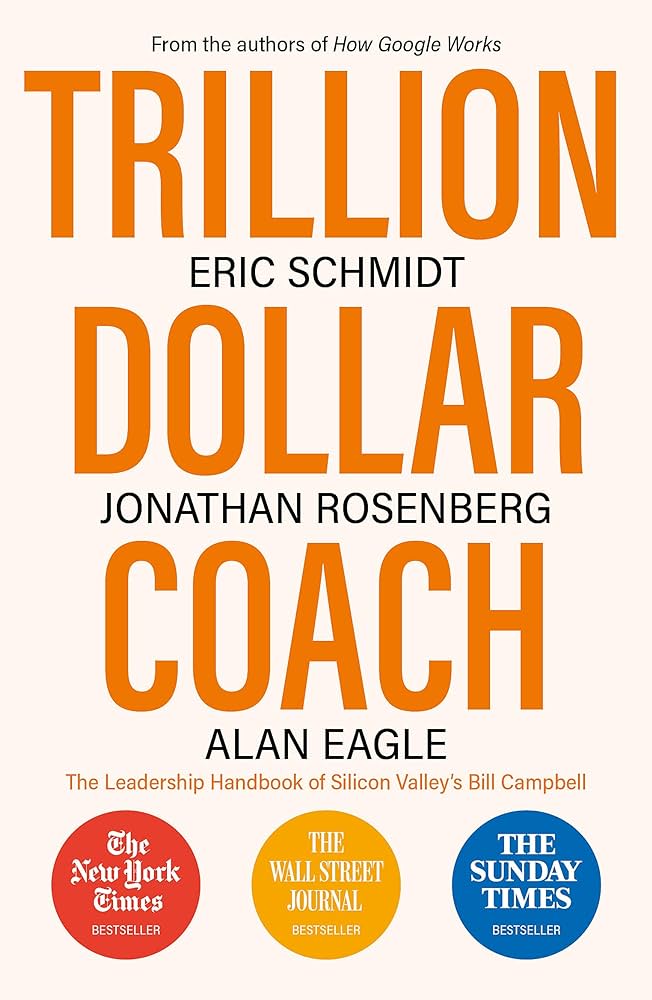
Review
Clearly Bill Campbell was a special coach. You might assume that everyone in the board room of a major technology company has their s*** together; but it’s all humans, all the way up. Even the best need coaches, and it creates work to make individuals and teams effective. There’s a bunch of great advice in this book, I didn’t find it the easiest to read but looking back through the notes there’s plenty of gold in this book. Coaching is an important skill – and although this isn’t a well structured, linear coaching manual – it’s got plenty of wise, actionable and timeless advice.
Key Takeaways
The 20% that gave me 80% of the value:
- Bill coached Steve Jobs, the Google Founders (Larry and Sergey) and the Google CEOs Schmidt and Sundar. All the Silicon Valley greats went to his funeral, many credit their success to him.
- Bill hugged everybody like a bear, brought love into the workplace and found the time for everyone.
- How Google Works forgot to mention the importance of teams.
- Bill primarily identified and resolved tensions.
- Everything he did was grounded in communication, respect, feedback and trust.
- High performing teams – need a leader that’s a good coach.
- The People manifesto
- People are what makes a company successful.
- Managers should concentrate on making people more effective, helping them grow and develop
- Great people want to do well and are capable of great things
- They will flourish in an environment that liberates and amplifies their energy
- Managers are responsible for creating that environment through support, respect and trust
- Support → give people tools, information, training and coaching needed to succeed.
- Respect → understand their goals & life choices. Align their needs with needs of the company
- Trust → free people to do their jobs, make decisions, know people want to do well, believe that they will
- Relationship Transparency → Listening + Feedback + Candor
- Set high standards → and support them to get there.
- Be one of the people who gives energy, not one who takes it away
- Qualities wanted in a coach: to listen, to understand and to encourage
- Your title makes you a manager. Your people make you a leader.
- The top priority of a manager is the well-being and success of her people
- The managers job is to run a decision making process that ensures all perspectives get heard and considered and if necessary to break ties and make the decision.
- Lead based on first principles. Define the first principles for the product / situation. Help guide the decision from those principles.
- The CEO should manage the board, not the other way around
- Only coach the coachable → Coachable traits: honesty, humility, perseverance, hard working, open to learning
- Practice free-form listening → Full attention, don’t think ahead, ask questions to get to the real issue
- No gap between statements and fact → Relentlessly honest and candid, couple negative feedback with caring, give feedback ASAP, deliver negative feedback privately
- Be the evangelist for courage → believe in people more than themselves, push them to be more courageous
- People are most effective when they can be themselves, bring their true identity to work
- Team First: Work the team, then the problem. Ensure the right team is working on the problem.
- Pick the right players. A combination of smarts and hearts
- Learn fast, hard working, GRIT, integrity, empathy, team first attitude
- Pair people wisely. Seek opportunities to pair the right people together on projects or decisions
- Pick the right players. A combination of smarts and hearts
Peer Feedback Survey (for SVPs)
- Over the last 12 months, to what extent do you think that the person:
- Displayed extraordinary in-role performance
- Exemplified world-class leadership
- Achieved outcomes that were in the best interest of Google
- Expanded the boundaries of what is possible for Google through innovation
- Collaborated effectively with peers
- Contributed effectively during senior team meetings (preparation, participation, listen, open, respectful, disagreed constructively)
- Product Leader Attributes
- Product Vision
- Product Quality
- Product Execution
- Open-Text Questions:
- What differentiates each SVP and makes him/her effective today?
- Advice would you give each SVP to be more effective or have greater impact?
- Winning depends on having the best team, the best teams have more women
- Concentrate on identifying the biggest problem – then tackle it first.
- Air negative issues. BUT don’t dwell on them. Move on as fast as possible.
- Ask about their lives outside of work, understand their families, when things get rough show up
- Cheer demonstrably for people and their successes
- Build communities inside and outside of work. A place is much stronger when people are connected
- Help people – be generous with your time, connections and other resources
- He measured his success by all the people that he’d managed to help in some way.